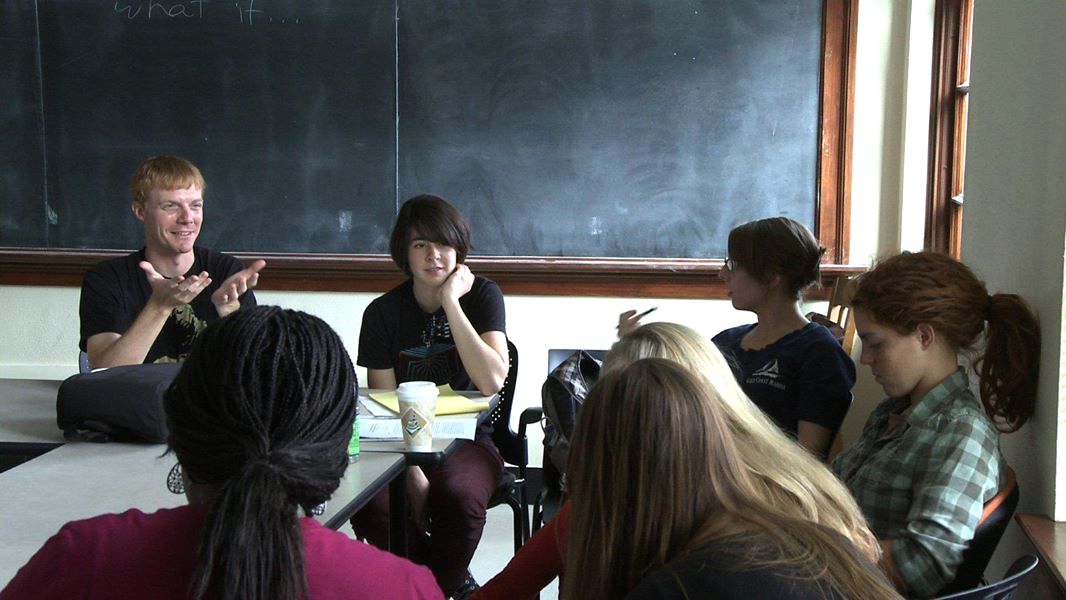According to Marshall McLuhan’s most famous aphorism, no TV show will ever be more important than the existence of the television as a medium. He never said that the content didn’t matter, he simply said that it didn’t matter as much as the medium itself. Justin Theroux is one of my favorite actors, but his own dismissal of television’s content has been poking at me for weeks:
If I was roped into a seven-year TV contract I’d probably hang myself. It’s a TV show — selling cars, cereal, soda pop… The shows are incidental to the commercials. I always laugh when TV shows pat themselves on the back for being cutting-edge. I mean, an interracial kiss on Ally McBeal is cutting-edge? I’ve never been shocked by anything on television, except the news (IMDB).

Though I agree with Theroux’s sentiments about TV’s commercialization, to dismiss the medium wholesale is to recklessly miss out on a phenomenon that defines the way we see the world and that has for generations. Since 1960, about 90% of American homes have hosted at least one television set (Spigel, 1992). Film might still be the more powerful medium overall, and the internet might be the newest, but television has a circulation, a frequency, and an intimacy that movies only borrow from time to time and a continuous nature that is rarely replicated online. Television is still the medium that tells our stories.
Moreover, we live in a world composed of the stories we tell, and all of the programming on TV is presented as entertainment — even the news (Signorielli & Morgan, 1996). Cultivation theory states that heavy watchers of television tend to believe that the world outside their homes is like the one they see on the screen (Gerbner, 1967), and the average daily viewing time of seven hours per household and three hours per person has been stable for decades. Where a rented movie or content streamed online offers one a point of krisis, a juncture at which a decision must be made to find something new to watch or to stop watching altogether, broadcast television does a good job of stringing viewers along via overlapping episodes and enticing cold opens. Frequent viewers also tend to be less selective, regardless of their stated preferences, and watch each show until it ends (Signorielli & Morgan, 1996). Sometimes we want to turn on and make decisions; others we want to turn off and just be entertained.
All of that adds up to one thing: content matters.

The TV’s got them images
TV’s got them all
It’s not shocking
Every half an hour
Someone’s captured and
The cop moves them along
It’s just like the show before
And the news is just another show…
— Jane’s Addiction, “Ted Just Admit It,” Nothing’s Shocking
Tom Hanks once said that film is for directors, theatre is for actors, and television is for writers. Lauren Beukes’ The Shining Girls being developed for TV, Dexter originally being a series of novels, as well as Veronica Mars‘ originally being planned as a young-adult novel speak to this. A show like Breaking Bad moves like a novel, while many movies are adapted from short stories. And a recent show like the Sundance Channel’s The Writer’s Room showcases broadcast, screen-based storytelling. The printed page and online flickering signifiers notwithstanding, television is the medium where writers get to shine.
I take it easy
The ice is thinning in the valley of the jeep beats
And when the freaks come out I hug a TV
Somehow a channel zero bender’s less creepy…
— Aesop Rock, “Easy,” Bazooka Tooth
“TV shows matter,” writes David Wong (2012). “They shape the lens through which you see the world. The very fact that you don’t think they matter, that even right now you’re still resisting the idea, is what makes all of this so dangerous to you — you watch… so you can turn off your brain and let your guard down. But while your guard is down, you’re letting them jack directly into that part of your brain that creates your mythology. If you think about it, it’s an awesome responsibility on the part of the storyteller.” I might not see the end of broadcast television, but even if it goes away, I don’t believe that the structure of the serial narrative will disappear. The idea of the TV show will endure. No matter what we watch it on.
References:
Farrell, Perry. (1988). Ted Just Admit It [Recorded by Jane’s Addiction]. On Nothing’s Shocking. Los Angeles: Warner Brothers.
Gerbner, George. (1967). Mass media and human communication theory. In F. E. X. Dance (Ed.), Human Communication Theory: Original Essays. New York: Holt, Rinehart & Winston, pp. 40-60.
Rock, Aesop. (2003). Easy. On Bazooka Tooth [LP]. New York: Definitive Jux.
Signorielli, Nancy & Morgan, Michael. (1996). Cultivation Analysis: Research and Practice. In Michael B. Salwen & Don W. Stacks (Eds.), An Integrated Approach to Communication Theory and Research. Mahwah, NJ: Lawrence Erlbaum Associates.
Spigel, Lynn. (1992). Make Room for TV: Televsion and the Family in Postwar America. Chicago, IL: University of Chicago Press.
Wong, David. (2012, August 6). 5 Ways You Don’t Realize Movies are Controlling Your Brain. Cracked.com

